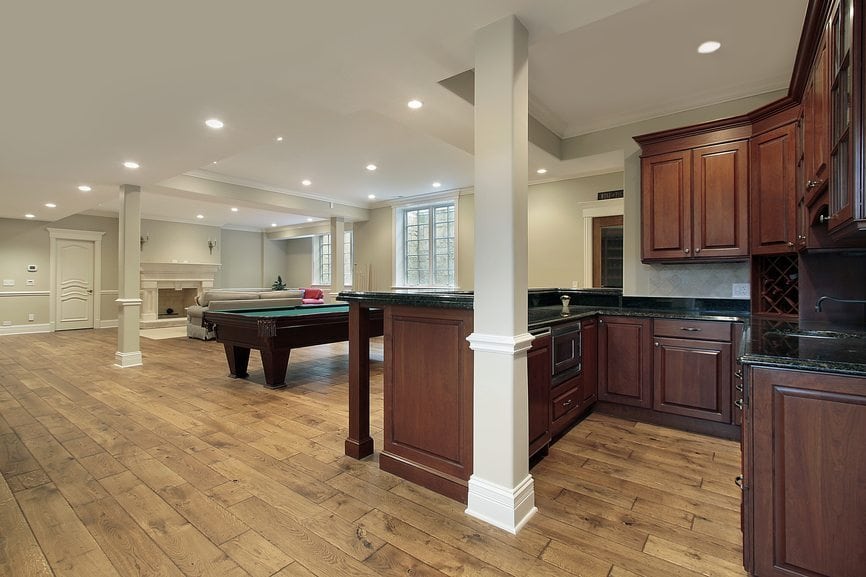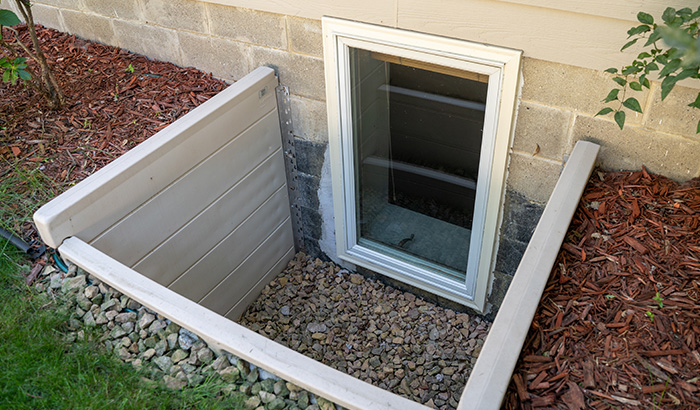Basement windows are often overlooked, but they carry out numerous essential functions pivotal to the overall well-being of your living space. These windows protect the health, safety, and efficiency of your home.
Primarily, these windows introduce natural light into an otherwise dim and enclosed basement area. This influx of daylight transforms a dark, uninviting space into a bright and welcoming part of your home, ideal for various uses like a home office, gym, or family room.
In addition to light, basement windows contribute significantly to ventilation. They allow for the exchange of indoor and outdoor air, which is crucial in preventing the buildup of moisture and the ensuing problems of mold and mildew, which are common in basements. Properly functioning windows help maintain air quality, which is crucial for a healthy living environment.
Moreover, basement windows play a vital role in energy efficiency. Windows that are well-sealed and properly insulated prevent heat loss during colder months and keep the space cooler during the summer. This thermal regulation makes the basement more comfortable and contributes to reduced energy consumption and lower utility bills.
Most importantly, basement windows are integral to home safety. In many regions, regulations mandate that basement living spaces have egress windows as emergency exits. This aspect of basement windows is not just a legal compliance issue but a critical safety feature that can be lifesaving in emergencies.
While they may be less prominent than their counterparts on higher floors, basement windows are indispensable components of a well-functioning home. Their maintenance and timely replacement not only enhance the comfort and usability of your basement but also contribute to your home’s overall safety, energy efficiency, and air quality.
Signs You Need to Replace Your Basement Windows
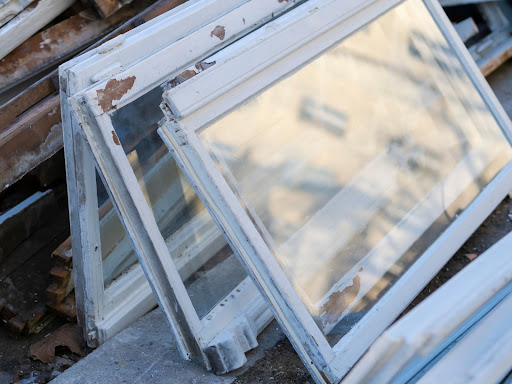
1. Age of the Windows
The lifespan of basement windows largely depends on their material and environmental factors. On average, windows last between 15 to 30 years. However, factors like frequent moisture exposure and temperature fluctuations in the basement can accelerate wear and tear.
If your windows are nearing or have surpassed the 20-year mark, assessing them for potential it’s about time to replace your basement windows. Aging windows often fail in efficiency and protection and are less effective against external elements.
2. Visible Damage
Physical signs of deterioration are clear indicators that your basement windows need attention. Look for cracks in the glass that compromise the window’s integrity and safety.
Warping or rotting frames, especially wooden window frames, are signs of prolonged exposure to moisture and indicate that the window is no longer providing a proper seal. These damages not only impact the window’s appearance but also its functionality.
3. Water Leakage
One of the most critical issues with basement windows is water leakage. This problem often originates from failed seals, allowing water to seep through during rain or snow melts. Consistent water intrusion can lead to more significant issues like mold growth and structural damage to your home.
Regularly inspect your basement windows for signs of water damage, such as peeling paint, swollen frames, or dampness around the window area.
4. Drafts and Energy Efficiency
Older windows are often culprits for drafts and poor energy efficiency. If you notice a noticeable change in temperature near your basement windows or an unexplained increase in your heating and cooling costs, it could be due to failing windows.
Modern replacement windows come with improved insulation and sealing technologies that significantly reduce energy loss, making your home more energy-efficient and comfortable.
5. Difficulty in Operation
Windows that are challenging to open or close signal a problem. It could be due to a variety of issues, such as rusting hardware, warping frames, or balance problems. Not only is this a convenience issue, but it also poses a safety concern, especially for egress windows required for emergency exits. Windows should operate smoothly for both functional and safety purposes.
Recognizing and promptly addressing these signs can prevent further damage and ensure that your basement remains safe, comfortable, and efficient. Regular inspection and timely replacement of your basement windows can save you from future costly repairs and enhance the overall quality of your living space.
The Benefits of Replacing Basement Windows
Replacing your basement windows comes with a multitude of advantages that extend beyond mere aesthetics. Understanding these benefits can help you appreciate the value of this home improvement decision.
1. Improved Energy Efficiency
Modern windows are designed with better insulation properties, such as double or triple glazing, or inert gas fills between panes, which minimize heat transfer. This means less heat escapes during winter and less heat enters during summer, leading to lower heating and cooling bills.
Additionally, high-quality seals and framing materials in new windows eliminate drafts, further contributing to energy savings and a more consistent indoor temperature.
2. Increased Home Value
Upgrading your basement windows is an investment that increases your home’s market value. Prospective homebuyers often look for homes that require minimal renovations, and new windows are a sign of a well-maintained property.
Additionally, the energy efficiency of modern windows is a selling point that is appealing to environmentally conscious buyers and those looking to save on utility costs.
3. Enhanced Safety and Security
Modern basement windows come equipped with features that enhance the safety and security of your home. This includes stronger, more durable materials that are difficult to break, as well as advanced locking mechanisms. These features deter potential intruders and provide peace of mind.
Furthermore, contemporary egress windows, designed for safe exits during emergencies, ensure compliance with safety regulations and add an essential safety feature to your home.
4. Better Ventilation and Natural Light
Replacing your basement windows improves the environment of your basement. New windows often offer better design options for increased natural light, making the basement feel more inviting and less like an enclosed space.
Adequate natural light has been linked to improved mood and productivity, which is particularly beneficial if the basement is used as a living or working space. Improved ventilation is another key benefit, as new windows can be opened and closed with ease, allowing for better air circulation. This helps to reduce dampness and prevent mold growth, ensuring a healthier living environment.
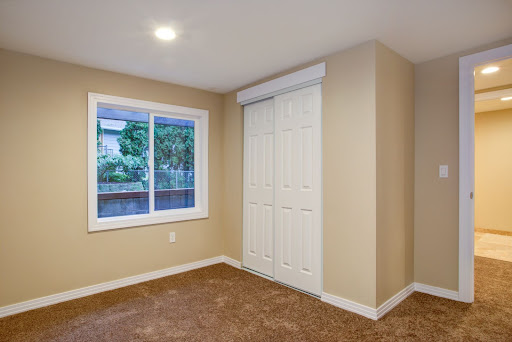
Choosing the Right Replacement Windows for Your Basement
Selecting the ideal replacement windows for your basement involves considering various factors, from materials and styles to glass options. Making an informed decision ensures your new windows meet both your functional needs and aesthetic preferences.
1. Materials: Pros and Cons
Vinyl Windows:
Vinyl is a popular choice due to its durability, low maintenance, and good insulation properties. They resist moisture, which is crucial for basements prone to dampness. On the downside, vinyl windows have limited color options and sometimes have a less premium look.
Wood Windows”
Wood offers a classic, warm aesthetic and excellent insulation. However, it requires more maintenance, as it’s susceptible to moisture and temperature changes, leading to potential warping or rotting. They are a good choice if you’re willing to commit to regular upkeep.
Aluminum Windows:
Known for their strength and slim profiles, aluminum windows are resistant to rust and corrosion, which makes them long-lasting. They’re also low maintenance. However, aluminum is a conductor of heat, making them less energy-efficient than other materials unless they have a thermal break.
2. Styles: Best for Basements
Sliding Windows:
These are easy to operate and don’t require any interior or exterior space to open, making them ideal for small or confined basement spaces.
Hopper Windows:
Hopper windows open inwards from the top, which are great for ventilation while preventing dirt and debris from entering through the window.
Awning Windows:
Similar to hoppers but opening outwards, awning windows are effective for ventilation and can be left open during light rain, providing continuous airflow.
3. Glass Options
Double-pane windows offer better insulation, keeping your basement warmer in winter and cooler in summer. They also provide better sound insulation. Single-pane windows are less expensive but offer minimal insulation and are less energy-efficient.
Look for low-E glass coatings to reduce UV exposure and argon gas fills between panes for enhanced thermal efficiency.
4. Hiring a Professional vs. DIY
DIY installation might be suitable for those with experience in home improvement projects. It may save on labor costs but requires a certain skill level to ensure proper installation.
Hiring a pro is recommended to ensure your windows are installed correctly, which is crucial for their performance and durability. Professionals can also help you choose the best windows for your specific basement conditions and needs.
When choosing replacement windows for your basement, consider these factors carefully. The right choice will enhance your basement’s functionality, improve energy efficiency, and complement the overall aesthetic of your home.
Whether you opt for a DIY approach or hire a professional, the key is to ensure the installation is done correctly for optimal performance and longevity.
Installation Tips and Considerations
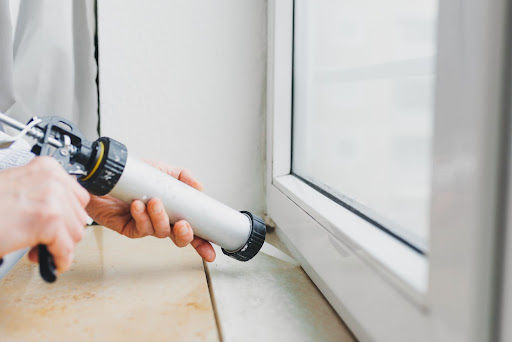
1. Preparing for Installation
Before the installation day arrives, there are several steps you should take to ensure a smooth process:
- Clear the Area: Remove any furniture, decorations, or obstacles near the windows inside and outside your home. This provides the installers with easy access and prevents any accidental damage to your belongings.
- Protect Your Belongings: Cover nearby items with drop cloths or plastic sheeting to protect them from dust and debris. This is particularly important in a basement where dust easily accumulates.
- Plan for Safety: If you have pets or small children, make arrangements to keep them safely away from the work area. This ensures their safety and allows the installers to work without interruptions.
- Verify Measurements: Before the installation day, it’s a good idea to reconfirm the measurements of the windows to avoid any last-minute surprises. Usually, the company installing the windows will handle this, but it doesn’t hurt to be sure.
2. The Installation Process
Understanding what to expect during the installation will help you prepare better.
The first step is the removal of your existing windows. This involves carefully taking out the old frames and panes, a process that can vary in complexity depending on the age and condition of the windows.
The new windows are then fitted into place. This involves securing the frames and ensuring they are level and properly sealed to prevent drafts and water leakage.
After the windows are installed, the installers will typically add trim, caulk the seams, and clean up any debris or dust created during the installation.
3. Maintenance Tips
Start by keeping the windows clean; this involves routinely wiping down not just the glass but also the frames and tracks. Regular cleaning prevents the buildup of dirt and debris that impede the smooth operation of the windows.
At least once a year, take a close look at the areas around the windows for any signs of cracks or gaps that may have formed. Resealing any gaps or cracks you find is a simple yet effective way to maintain the energy efficiency of your windows.
If your basement windows include styles with moving parts, such as sliding or hopper windows, periodic lubrication facilitates smoother operation and prolongs the life of the mechanisms involved.
By properly preparing for installation and maintaining your new basement windows, you enhance their functionality and longevity. These steps ensure that your windows remain a valuable addition to your basement, providing light, ventilation, and energy efficiency for years to come.
Experience the Benefits of the Best Window Well Covers from Windowell Expressions
Windowell Expressions offers quality and customer satisfaction while providing custom window well covers and liners. Enhance the safety and functionality of your window wells and add an aesthetic appeal to your home with help from Windowell Expressions.
A free quote is just a call away at 801-683-0838.

